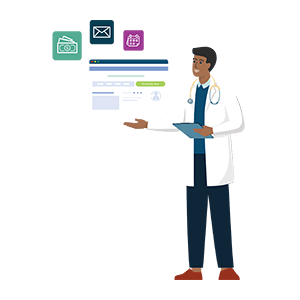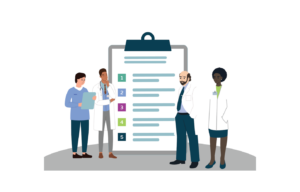Revenue Cycle Optimization Considerations for Gastroenterology Practices
By Blakely Roth | February 23, 2023
It’s undeniable that eating a well-balanced diet can create long-term health benefits for patients. Similarly, the right financial inputs on the front of your revenue cycle can create healthier practice growth.
At the beginning of the patient journey, high-growth gastroenterology practices use digital solutions to improve eligibility verification, financial transparency and data capture. As a result, these practices file cleaner claims and enable faster time-to-revenue, while providing a top-line patient experience. Achieve similar practice and profit health by optimizing your entire revenue cycle.
Use these questions and action steps to determine opportunities for improvement.
Insurance Eligibility Verification
1. Are your staff able to verify insurance correctly and in a timely manner?
Rather than wait on staff to get in touch with insurance payers or solve issues on their own, practices can streamline front-end operations by automatically verifying insurance at every patient touchpoint. Take the manual time and challenge out of insurance verification by automating the entire process. With a real-time insurance verification tool, you can instantly determine primary, secondary and tertiary benefits at every interaction to ensure coverage has not lapsed – all before a patient receives care.
If you already have an insurance verification solution, does it provide the results you need? Any lag time in insurance verification can lead to an inability to collect patient payments at the point of service, leaving you with no choice but to send a claim to your patients later on in the revenue cycle.
Be sure to find a solution that won’t lag or charge a fee for insurance verification, so your staff can review the latest information and you can collect the correct patient payments at check in. Leverage these tools and create workflows for staff to solve any insurance issues prior to patients arriving at the office. Use a similar approach to decrease claims rejections by 90% and drive a 65% improvement in collection rates.

2. What number of claims are rejected each year due to bad insurance information?
Medical claim rejections significantly hinder revenue growth, and research shows that 65% of these rejections are never reworked, leading to substantial profit leakage. Healthy gastroenterology and endocrinology practices lean into digital tools to solve insurance issues on the front-end of their revenue cycle to reduce the number of claims rejections that will need to be reworked on the back end.
With 86% of mistakes made in the healthcare industry coming as a result of administrative errors, consider how you can benefit from patient-led self-scheduling and registration. By having patients provide their own data, your practice will minimize the potential for staff errors that can occur through manual pen and clipboard check-in systems. By using patient self-service scheduling and registration solutions, coupled with instant eligibility verification, high-growth practices improve data accuracy and face fewer write-offs and claims rejections, creating healthier cash flow.
Payment Responsibility
1. What type of payments does your staff collect from patients at check-in?
The probability of collecting once a patient leaves the office is 30%, meaning what your staff are able to collect at check-in will greatly impact back-end revenue streams.
With a busy waiting room, uncertainty around patient responsibility due or staff who neglect to collect payments at check-in, you leave room for profit leakage every day. Gastroenterology practice leaders set their practices up for success by having patients check-in or pre-register using digital tools. With private, patient-led solutions for registration, like a kiosk or mobile pre-check link, you can customize your workflow to always ask for payment. With digital tools collecting point-of-service payments, you no longer need to solely rely on staff for collections. As a result, practices see immediate increases in point-of-service payments, up to 100% or more.

2. What did you write off last year in copays and outstanding balances?
Reducing write-offs is top of mind for any practice, considering providers want to receive their hard-earned revenue. Reduce the amount of patient responsibility due on the back end of your revenue cycle by optimizing your front-end approach.
A patient revenue platform™ can help you tackle many of the challenges that result in outstanding balances. For example, one practice invested in digital patient revenue solutions that would simplify estimations, rather than rely on staff to contact insurance payers and rush to capture compliant and timely estimates. After implementing the approach, Chief Executive Officer Jennifer White shared, “With almost a click of a button, we get our patient’s eligibility confirmed, deductible balance and what their out-of-pocket responsibility will be for their visit. Then, we get that information to the patient.”
Today, the practice provides patients with financial transparency prior to receiving care. As a result, patients come in prepared to pay and the practice’s self-pay responsibility due has decreased significantly. Learn about the practice’s approach and how you can leverage the same digital solutions to implement a revenue-driving patient estimations strategy – all with the push of a button.
A Growth-focused Solution for Gastroenterology Practices
Streamline the front end of your billing and registration process to accelerate cash flow this year. Choose the solution that will help you achieve your revenue goals, without burdening staff or incurring unexpected costs. Gastroenterology practices choose Clearwave Core to unlock their growth potential. Contact us and let’s get you paid!
Recommended for you
Related Posts
Calculate How Medical Insurance Verification Software Saves 500+ Staff Hours
Reading Time: 3 minutesBy Blakely Roth | April 16, 2025 Stretched thin in the billing or administrative department and looking for a way…
How FQHCs Improve Revenue Management With Patient Kiosks
Reading Time: 3 minutesBy Blakely Roth | April 9, 2025 East Jordan Family Health Center (EJFHC) is a Federally Qualified Health Center (FQHC)…
Best Patient Check-In Software for Practices That Need to Reduce Costs
Reading Time: 5 minutesBy Chloe From Clearwave | April 8, 2025 Costs are on the rise, what are you doing now to combat…




